Module 1 How to learn English Unit 1 Let's try to speak English as much as possible. 课件55张缺少音频
文档属性
| 名称 | Module 1 How to learn English Unit 1 Let's try to speak English as much as possible. 课件55张缺少音频 |
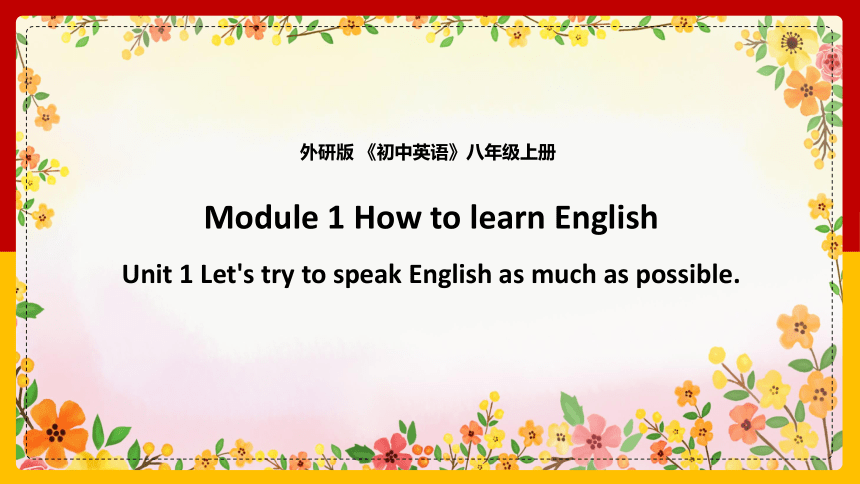
|
|
| 格式 | ppt | ||
| 文件大小 | 5.2MB | ||
| 资源类型 | 教案 | ||
| 版本资源 | 外研版 | ||
| 科目 | 英语 | ||
| 更新时间 | 2021-09-11 00:00:00 | ||
图片预览







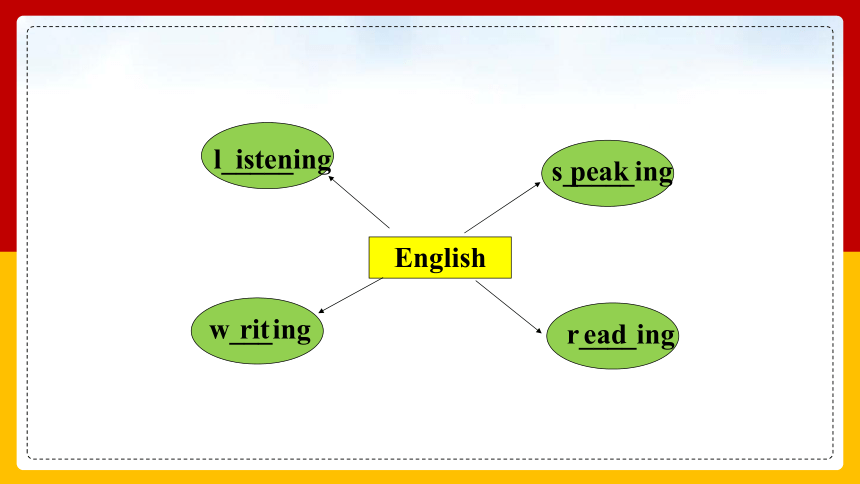
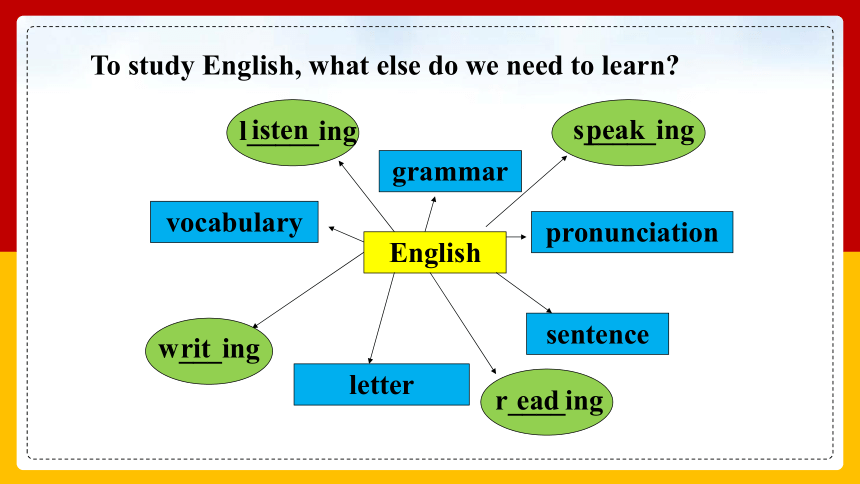
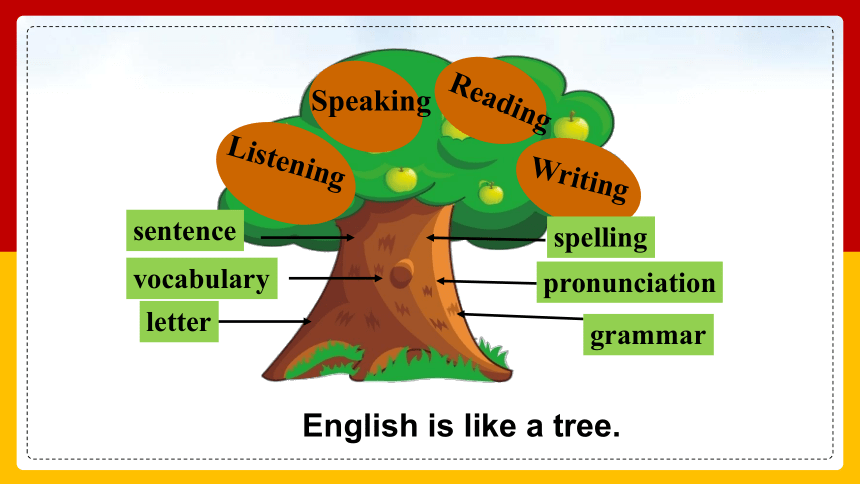
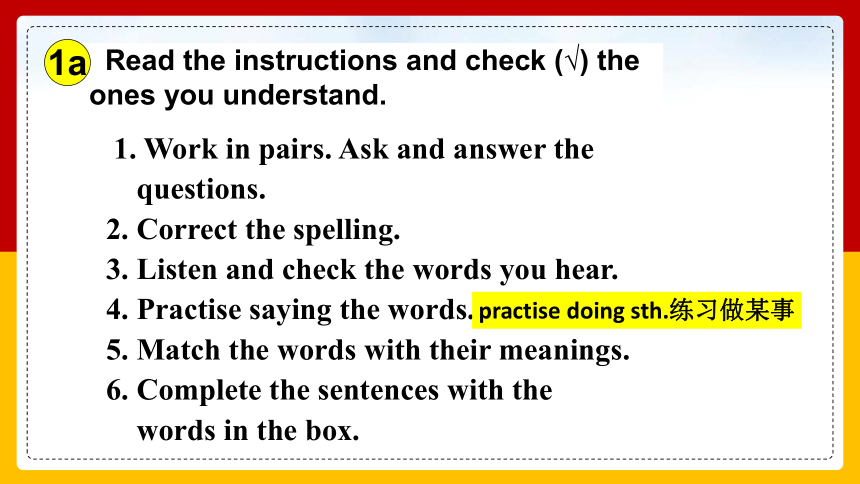
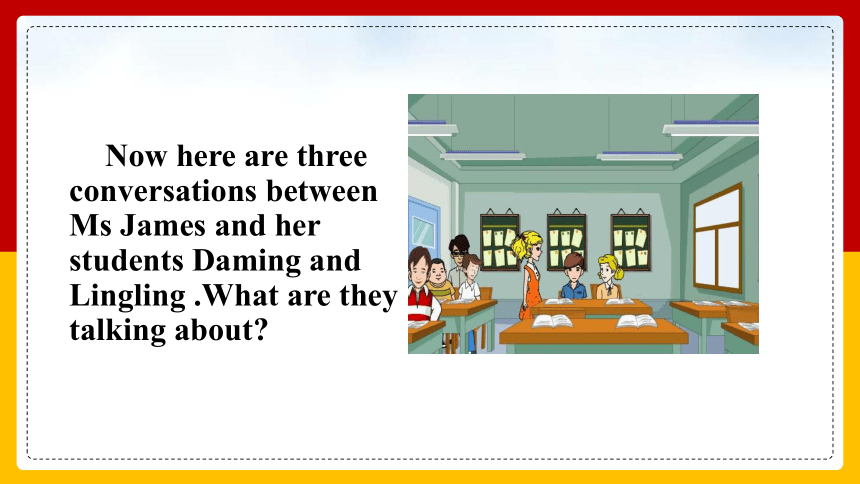
文档简介
(共55张PPT)
外研版
《初中英语》八年级上册
Module
1
How
to
learn
English
Unit
1
Let's
try
to
speak
English
as
much
as
possible.
上21世纪教育网
下精品教学资源
Welcome
back,everyone!
全球语言的普及面
Which
is
the
most
useful
language
in
the
world?
Warming-up
Now
we
can
often
see
English
in
our
daily
life.
TV
Web
Now
we
can
often
see
English
in
our
daily
life.
TV
radio
class
notice
newspaper
news
books
business
How
do
we
usually
learn
English?
Discussion
English
s_____ing
l_____ing
r____ing
w___ing
isten
ead
peak
rit
English
sentence
vocabulary
pronunciation
grammar
letter
s_____ing
l_____ing
r____ing
w___ing
isten
ead
peak
rit
To
study
English,
what
else
do
we
need
to
learn?
letter
vocabulary
sentence
grammar
pronunciation
spelling
English
is
like
a
tree.
1.
Work
in
pairs.
Ask
and
answer
the
questions.
2.
Correct
the
spelling.
3.
Listen
and
check
the
words
you
hear.
4.
Practise
saying
the
words.
5.
Match
the
words
with
their
meanings.
6.
Complete
the
sentences
with
the
words
in
the
box.
Read
the
instructions
and
check
(√)
the
ones
you
understand.
1a
practise
doing
sth.练习做某事
Now
here
are
three
conversations
between
Ms
James
and
her
students
Daming
and
Lingling
.What
are
they
talking
about?
Listen,look
and
say.
2
dictionary
grammar
letter
look
up
make
a
mistake
understand
1
Which
word
did
Daming
not
understand??
He
didn’t
understand
the
word
“spring”.
2
What
mistake
did
Lingling
make?
She
made
a
grammar
mistake.
She
said
“go”
instead
of
“went”.
make
a
mistake犯错
3
How
does
Daming
usually
check
the
spelling
of
a
word?
He
looks
it
up
in
the
dictionary.
4
Why
was
it
difficult
for
Daming
to
check
the
spelling
of
cinema?
Because
he
didn’t
know
the
first
letter.
look
(it/them)up
in
the
dictionary查字典
Tape
script
Role
play
the
conversation.
Daming:?I?have?a?question.?What?does?―spring
mean??
Ms?James:?Spring??Spring?is?a?season.?It?comes?after?winter
and?
before?summer.?Try?to?remember?our?famous
Spring?Festival,?
Daming.??
Daming:?Oh,?I?understand.??
Ms?James:?Lingling,?your?grammar?isn’t?correct.?You?made?a?
mistake.?It’s?not?―Yesterday?I?go?
to?the
cinema?but―Yesterday
?I…?.??
Lingling:?Went.?
Ms?James:?Good.?―Today?I?have?an?English?lesson.?Yesterday?I…?
Lingling:?Had.??
Daming:?How?do?you?spell?―cinema???I?know?how?to?pronounce?it,?
but?does?it?begin?with?―s?or?―c???
Ms?James:?What?do?you?think??How?do?you?check?the?spelling?of?a?
word,?Daming??
Daming:?Well,?I?usually?look?it?up?in?the?dictionary.?
But?this?one?is?difficult?because?I?don’t?know?
the?first?letter!
Daming
doesn’t
know
the
________
of
the
word
“spring”.
Well,
it’s
a
season.
It
comes
after
winter
and
before
summer.
________remember
our
famous
Spring
Festival.
He
also
doesn’t
know
the________of
the
word
“cinema”.
He
usually
________________in
a
dictionary.
But
this
one
is
difficult.
Because
he
doesn’t
know
the
first________.
meaning
Try
to
spelling
looks
them
up
letter
Lingling’s________isn’t
correct.
She
________________.
I
think
she
should
________
the
mistake
in
the
________.
grammar
made
a
mistake
write
down
notebook
Brainstorm
How
about
listening
to
the
radio
?
What
about
reading
English
newspaper
or
reading
English
stories?
You
should
always
speak
English
in
class.
You
should
try
to
speak
English
as
much
as
possible.
Why
don’t
you
try
to
find
some
English
pen
friends?
Why
not
keep
an
English
diary
every
day?
It’s
a
good
idea
to
spell
and
pronounce
new
words
aloud
every
day.
It’s
a
good
idea
to
look
up
new
words
in
the
dictionary.
Why
not
write
down
our
mistakes
in
our
notebooks?
Don’t
forget
to
write
down
the
correct
answers
next
to
the
mistakes.
You
should
(do)
…
Why
don’t
you
(do)…?
How
about
(doing)…?
Try
to
(do)…
Try
not
to
(do)
…
What
about
(doing)…?
你应该……
干嘛不……
?
……怎么样?
努力(做)……
努力不(做)……
表示提建议的句型有:
It's
a
good
idea
(to
do)
…
做……是个好主意
Language
points
1.
Shall
we/I
…?
Shall
we
go
boating?
我们去划船好吗?
2.
Would
you
like
sth./to
do
sth.?
Would
you
like
to
go
fishing?
你想去钓鱼吗?
对这些建议的肯定回答可以是OK./Good
idea.
/All
right.等。
否定回答可以是No,
let’s…
/
Sorry.
或
I
want
to
but…等。
此外,
用于提出建议的还有下面两种句型:
New
drills
Now
here
is
a
conversation
between
Ms
James
and
her
students
Daming
and
Lingling
.What
are
they
talking
about?
1.
Ms
James
is
going
to
give
her
students
some
____.
A.
homework
B.
advice
C.
gifts
2.
They
are
talking
about
_________.
A.
what
they
will
do
in
the
English
class
B.
how
to
speak
English
C.
how
to
learn
English
Listening
task1
Listen
and
choose.
Listen
again
and
fill
the
blanks
according
to
the
dialogue.
?
speak
English
as
_____
as
________
?
write
down
our
________
in
our
notebooks
?
the
_______
answers
?
_________
new
words
aloud
?
don’t
need
to
understand
___________
?
know
a
lot
about
the
world
through
______
?
find
some
English
__________
much
mistakes
possible
pronounce
correct
reading
every
word
pen
friends
Listening
task2
Video
time
Let's
watch
the
video.
Private
Sub
ShockwaveFlash1_OnReadyStateChange(ByVal
newState
As
Long)
End
Sub
Reading
task1
Read
and
decide
T/F.
1.
Speak
Chinese
in
class.
2.
Write
the
mistakes
in
the
notebooks.
3.
Write
down
the
correct
answers
next
to
the
mistakes.
4.
Listen
to
English
radio
programme.
5.
Read
English
stories.
6.
Try
to
understand
every
word.
Reading
task2
Find
advice
on
learning
English
in
the
dialogue.
1.
We
should
always
speak
English
in
class!
3.
Why
not
write
down
the
mistakes
in
our
notebooks?
2.
Let’s
try
to
speak
English
as
much
as
possible.
4.
Don’t
forget
to
write
down
the
correct
answers
next
to
the
mistakes.
5.
It’s
a
good
idea
to
spell
and
pronounce
new
words
aloud
every
day.
6.
How
about
listening
to
the
radio?
7.
Why
don’t
we
try
to
find
some
English
pen
friends?
Listening:
listen
to
the
radio.
Speaking:
Reading:
spell
and
pronounce
new
words
aloud
every
day
try
to
speak
English
as
much
as
possible
read
English
stories
Now
write
notes
about
learning
English.
Reading
task3
Writing:
Learning
new
words:
write
to
English
pen
friends
Ms
James:
Welcome
back,
everyone!
Today,
we’re
going
to
talk
about
good
ways
to
learn
English.
Ready?
Who
has
some
advice?
Lingling:
We
should
always
speak
English
in
class.
Ms
James:
Good!
Let’s
try
to
speak
English
as
much
as
possible.
Daming:
Why
not
write
down
the
mistakes
in
our
notebooks?
Ms
James:
That’s
a
good
idea.
And
don’t
forget
to
write
down
the
correct
answers
next
to
the
mistakes.
What
else?
Lingling:
It’s
a
good
idea
to
spell
and
pronounce
new
words
aloud
every
day.
Ms
James:
Thanks
a
lot,
Lingling.
How
about
listening
to
the
radio?
Reading
task4
Listen
and
repeat.
Daming:
Yes,
that’s
good
for
our
pronunciation
too.
But
there
are
so
many
new
words.
Ms
James:
You
don’t
need
to
understand
every
word.
You
just
need
to
listen
for
key
words
and
main
ideas.
Daming:
That’s
the
same
for
reading.
English
stories
are
so
interesting.
I
get
to
know
a
lot
about
the
world
through
reading.
Lingling:
I
think
writing
is
also
important.
Why
don’t
we
try
to
find
some
English
pen
friends.
We
can
write
to
them.
Ms
James:
Excellent!
I
agree
with
you.
Everyday
English
Ready?
That’s
a
good
idea.
What
else?
Thanks
a
lot.
Excellent!
1.
Who
has
some
advice?谁有一些建议?
advice
n.
意见;
建议,不可数名词,表示一条建议时用a/one
piece
of
advice;表示一些建议时常用some
advice。
常用的固定搭配有:
①give
some
advice
on.
.
.
“在……方面提建议”;
②take/follow
one’s
advice
“接受某人的建议”;
③ask
for
one’s
advice
“征求某人的建议”。
Language
points
My
English
teacher
gave
me
some
advice
on
English.
我的英语老师曾在英语方面给我提过一些建议。
If
you
take
my
advice,
you
can
pass
the
test.
如果你听我的建议,你会通过这次考试的。
2.
Why
not
write
down
our
mistakes
in
our
notebooks?
你为什么不把错误记在笔记本上?
句型Why
not.
.
.
?
相当于Why
don’t
you/we.
.
.
?
意为“为什么不……呢?
”,
其后面跟动词原形,
是提建议的一种句型。
write
down
写下,记下,是个
“动-副短语”,
当名词作宾语时,
可以在
down
之前,也可以在
down
之后。但代词作宾语时,
代词只能放在write和down之间。
Why
not
go
for
a
walk?
=
Why
don’t
you
go
for
a
walk?
为什么不去散步呢?
Please
write
down
your
name.=Please
write
your
name
down.
请写下你的名字。
Write
them
down,
please.请把它们记下来。
3.
Let’s
try
to
speak
English
as
much
as
possible.让我们尽可能地多说英语。
try
to
do
sth.
努力做某事,强调付出一定的努力。
try
doing
sth.
试着做某事,但不一定付出很大努力。
try
one’s
best
do
sth.尽某人最大的努力做某事。
try
not
to
do
sth.
努力/尽量不做某事
as
much
as
possible
尽量,尽最大努力(可能)
We
should
try
not
to
make
any
mistakes.
我们应该尽量不犯错误。
Why?didn’t?you?try?riding?a?bike?to?go?to?school?
为什么不试着骑车去学校呢?
I
will
help
you
as
much
as
possible.
我将会尽我所能地帮助你。
4.
And
don’t
forget
to
write
down
the
correct
answers
next
to
the
mistakes.
不要忘记把正确的答案写在错误旁。
反义词
remember
remember
/
forget
to
do
sth.记得
/
忘记要去做某事
(事情没有发生)
remember
/
forget
doing
sth.记得/忘记曾经做过某事
(事情发生过)
correct“改正,纠正”,也可作形容词“正确的,无误的”
I
forgot
borrowing
some
money
from
you.
我忘了从你那儿借了一些钱了。(钱已借过)
Don't
forget
to
buy
some
fruit.别忘了买一些水果。(水果还没买)
5.
It’s
a
good
idea
to
spell
and
pronounce
new
words
aloud.大声拼读出新单词是个好主意。
It's
a
good
idea
to
do
sth.
意思是“做……是个好主意”。
It's
a
good
idea
for
sb.
to
do
sth.意思是
“对某人来说是个好主意”。
本句中的it是形式主语,真正的主语是动词不定式to
spell
and
pronounce
new
words
aloud
。
It’s
a
good
idea
to
write
down
the
teacher’s
notes.
记下老师的笔记是一个好想法。
It’s
a
good
idea
for
you
to
walk
after
supper.
对你来说,晚饭后散散步是个好主意。
write
down
next
to
each
other
try
to
+
v.
原形
can
+
v.
原形
should
+
v.
原形
Ready?
What
else?
help…
with
…
写下
旁边
互相
努力做某事
能
应该
准备好了吗?
还有其他的吗?
帮忙……
1.
Excellent!
优秀的;棒极了!
2.
That’s
a
good
idea.
这是个好主意。
3.
Thanks
a
lot.
非常感谢。
4.
Why
don’t
you/why
not
do
+
v.
原形
为什么你不做……呢?
5.
How
(what)
about
+
v.-ing
……怎么样呢?
6.
It’s
a
good
idea
to
+
v.
原形
做……是个好主意。
Here
is
my
(1)
advice
/
notebook
on
learning
English.
Speak
English
(2)
always
/
as
much
as
possible
in
class,
and
listen
to
English
(3)
in
the
newspaper
/
on
the
radio.
I
(4)
agree
/
forget
it
is
a
good
idea
to
look
up
new
words
in
the
(5)
notebook
/
dictionary.
You
can
find
the
(6)
correct
/
excellent
pronunciation
and
learn
the
meaning.
Underline
the
correct
words.
4
Listen
and
mark
the
intonation.
5
1
We
should
always
speak
English
in
class.
2
Let’s
try
to
speak
English
as
much
as
possible.
3
Why
not
write
down
the
mistakes
in
our
notebooks?
4
It’s
a
good
idea
to
spell
and
pronounce
new
words
aloud.
5
How
about
listening
to
the
radio?
Now
listen
again
and
repeat.
英语有两种基本语调:升调和降调。说话人可通过语调准确地表达各种信息。
升调(↗)多用来表示
“不肯定”
和
“未完结”,
在一般疑问句、委婉的祈使句和打招呼的用语中。
降调(↙)表示“肯定”和“完结”,一般出现在陈述句、祈使句和特殊疑问句中。感叹句中多用降调表示感叹。
Role
play
Work
in
groups.
Characters:Ms
James;
Daming;Lingling;
Setting:
In
English
class
Events:
Talk
about
how
to
learn
English
well
Requirements:
★分角色
★有场景,有表演
★
声音流畅、洪亮、注意升降调
★3
minutes
Discussion
What
else
can
we
do
to
improve
our
English?
ask
the
teacher
for
help
watch
English
movies
sing
English
songs
practise
conversations
with
foreigners
watch
TV
in
English
read
English
books
What
should
you
do
to
improve
your
English?
1.
grammar
2.
listening
3.
vocabulary
4.
writing
5.
reading
6.
speaking
Do
more
grammar
exercises.
Listen
to
English
programmes.
Remember
the
meanings
of
each
word
and
read
English
materials.
Write
diary
every
day.
Read
English
materials
and
do
the
comprehensive
questions.
Speak
English
with
your
English
teacher,
classmates
or
foreigners.
Work
in
pairs.
Talk
about
problems
in
learning
English
and
give
advice.
6
Problems
Advice
I
can’t…
I
don’t
know…
How/
What
about…?
Why
don’t
you/
not…?
-I
can’t
speak
English
well.
What
should
I
do?
-Why
don’t
you
try
to
talk
to
our
classmates
in
English?
Example:
Now
it’s
your
turn!
Are
you
ready?
GO!
本课时主要短语和句型
1.practise
doing
sth;make
a
mistake;as…as
possible;
write
down;agree
with;
2.表建议:Why
don’t
you
…?
What
else?
That’s
a
good
idea.
How
about
…?
Try
(not)
to
…
You
should
…
Summary
外研版
《初中英语》八年级上册
教学课件
非常感谢收看
外研版
《初中英语》八年级上册
Module
1
How
to
learn
English
Unit
1
Let's
try
to
speak
English
as
much
as
possible.
上21世纪教育网
下精品教学资源
Welcome
back,everyone!
全球语言的普及面
Which
is
the
most
useful
language
in
the
world?
Warming-up
Now
we
can
often
see
English
in
our
daily
life.
TV
Web
Now
we
can
often
see
English
in
our
daily
life.
TV
radio
class
notice
newspaper
news
books
business
How
do
we
usually
learn
English?
Discussion
English
s_____ing
l_____ing
r____ing
w___ing
isten
ead
peak
rit
English
sentence
vocabulary
pronunciation
grammar
letter
s_____ing
l_____ing
r____ing
w___ing
isten
ead
peak
rit
To
study
English,
what
else
do
we
need
to
learn?
letter
vocabulary
sentence
grammar
pronunciation
spelling
English
is
like
a
tree.
1.
Work
in
pairs.
Ask
and
answer
the
questions.
2.
Correct
the
spelling.
3.
Listen
and
check
the
words
you
hear.
4.
Practise
saying
the
words.
5.
Match
the
words
with
their
meanings.
6.
Complete
the
sentences
with
the
words
in
the
box.
Read
the
instructions
and
check
(√)
the
ones
you
understand.
1a
practise
doing
sth.练习做某事
Now
here
are
three
conversations
between
Ms
James
and
her
students
Daming
and
Lingling
.What
are
they
talking
about?
Listen,look
and
say.
2
dictionary
grammar
letter
look
up
make
a
mistake
understand
1
Which
word
did
Daming
not
understand??
He
didn’t
understand
the
word
“spring”.
2
What
mistake
did
Lingling
make?
She
made
a
grammar
mistake.
She
said
“go”
instead
of
“went”.
make
a
mistake犯错
3
How
does
Daming
usually
check
the
spelling
of
a
word?
He
looks
it
up
in
the
dictionary.
4
Why
was
it
difficult
for
Daming
to
check
the
spelling
of
cinema?
Because
he
didn’t
know
the
first
letter.
look
(it/them)up
in
the
dictionary查字典
Tape
script
Role
play
the
conversation.
Daming:?I?have?a?question.?What?does?―spring
mean??
Ms?James:?Spring??Spring?is?a?season.?It?comes?after?winter
and?
before?summer.?Try?to?remember?our?famous
Spring?Festival,?
Daming.??
Daming:?Oh,?I?understand.??
Ms?James:?Lingling,?your?grammar?isn’t?correct.?You?made?a?
mistake.?It’s?not?―Yesterday?I?go?
to?the
cinema?but―Yesterday
?I…?.??
Lingling:?Went.?
Ms?James:?Good.?―Today?I?have?an?English?lesson.?Yesterday?I…?
Lingling:?Had.??
Daming:?How?do?you?spell?―cinema???I?know?how?to?pronounce?it,?
but?does?it?begin?with?―s?or?―c???
Ms?James:?What?do?you?think??How?do?you?check?the?spelling?of?a?
word,?Daming??
Daming:?Well,?I?usually?look?it?up?in?the?dictionary.?
But?this?one?is?difficult?because?I?don’t?know?
the?first?letter!
Daming
doesn’t
know
the
________
of
the
word
“spring”.
Well,
it’s
a
season.
It
comes
after
winter
and
before
summer.
________remember
our
famous
Spring
Festival.
He
also
doesn’t
know
the________of
the
word
“cinema”.
He
usually
________________in
a
dictionary.
But
this
one
is
difficult.
Because
he
doesn’t
know
the
first________.
meaning
Try
to
spelling
looks
them
up
letter
Lingling’s________isn’t
correct.
She
________________.
I
think
she
should
________
the
mistake
in
the
________.
grammar
made
a
mistake
write
down
notebook
Brainstorm
How
about
listening
to
the
radio
?
What
about
reading
English
newspaper
or
reading
English
stories?
You
should
always
speak
English
in
class.
You
should
try
to
speak
English
as
much
as
possible.
Why
don’t
you
try
to
find
some
English
pen
friends?
Why
not
keep
an
English
diary
every
day?
It’s
a
good
idea
to
spell
and
pronounce
new
words
aloud
every
day.
It’s
a
good
idea
to
look
up
new
words
in
the
dictionary.
Why
not
write
down
our
mistakes
in
our
notebooks?
Don’t
forget
to
write
down
the
correct
answers
next
to
the
mistakes.
You
should
(do)
…
Why
don’t
you
(do)…?
How
about
(doing)…?
Try
to
(do)…
Try
not
to
(do)
…
What
about
(doing)…?
你应该……
干嘛不……
?
……怎么样?
努力(做)……
努力不(做)……
表示提建议的句型有:
It's
a
good
idea
(to
do)
…
做……是个好主意
Language
points
1.
Shall
we/I
…?
Shall
we
go
boating?
我们去划船好吗?
2.
Would
you
like
sth./to
do
sth.?
Would
you
like
to
go
fishing?
你想去钓鱼吗?
对这些建议的肯定回答可以是OK./Good
idea.
/All
right.等。
否定回答可以是No,
let’s…
/
Sorry.
或
I
want
to
but…等。
此外,
用于提出建议的还有下面两种句型:
New
drills
Now
here
is
a
conversation
between
Ms
James
and
her
students
Daming
and
Lingling
.What
are
they
talking
about?
1.
Ms
James
is
going
to
give
her
students
some
____.
A.
homework
B.
advice
C.
gifts
2.
They
are
talking
about
_________.
A.
what
they
will
do
in
the
English
class
B.
how
to
speak
English
C.
how
to
learn
English
Listening
task1
Listen
and
choose.
Listen
again
and
fill
the
blanks
according
to
the
dialogue.
?
speak
English
as
_____
as
________
?
write
down
our
________
in
our
notebooks
?
the
_______
answers
?
_________
new
words
aloud
?
don’t
need
to
understand
___________
?
know
a
lot
about
the
world
through
______
?
find
some
English
__________
much
mistakes
possible
pronounce
correct
reading
every
word
pen
friends
Listening
task2
Video
time
Let's
watch
the
video.
Private
Sub
ShockwaveFlash1_OnReadyStateChange(ByVal
newState
As
Long)
End
Sub
Reading
task1
Read
and
decide
T/F.
1.
Speak
Chinese
in
class.
2.
Write
the
mistakes
in
the
notebooks.
3.
Write
down
the
correct
answers
next
to
the
mistakes.
4.
Listen
to
English
radio
programme.
5.
Read
English
stories.
6.
Try
to
understand
every
word.
Reading
task2
Find
advice
on
learning
English
in
the
dialogue.
1.
We
should
always
speak
English
in
class!
3.
Why
not
write
down
the
mistakes
in
our
notebooks?
2.
Let’s
try
to
speak
English
as
much
as
possible.
4.
Don’t
forget
to
write
down
the
correct
answers
next
to
the
mistakes.
5.
It’s
a
good
idea
to
spell
and
pronounce
new
words
aloud
every
day.
6.
How
about
listening
to
the
radio?
7.
Why
don’t
we
try
to
find
some
English
pen
friends?
Listening:
listen
to
the
radio.
Speaking:
Reading:
spell
and
pronounce
new
words
aloud
every
day
try
to
speak
English
as
much
as
possible
read
English
stories
Now
write
notes
about
learning
English.
Reading
task3
Writing:
Learning
new
words:
write
to
English
pen
friends
Ms
James:
Welcome
back,
everyone!
Today,
we’re
going
to
talk
about
good
ways
to
learn
English.
Ready?
Who
has
some
advice?
Lingling:
We
should
always
speak
English
in
class.
Ms
James:
Good!
Let’s
try
to
speak
English
as
much
as
possible.
Daming:
Why
not
write
down
the
mistakes
in
our
notebooks?
Ms
James:
That’s
a
good
idea.
And
don’t
forget
to
write
down
the
correct
answers
next
to
the
mistakes.
What
else?
Lingling:
It’s
a
good
idea
to
spell
and
pronounce
new
words
aloud
every
day.
Ms
James:
Thanks
a
lot,
Lingling.
How
about
listening
to
the
radio?
Reading
task4
Listen
and
repeat.
Daming:
Yes,
that’s
good
for
our
pronunciation
too.
But
there
are
so
many
new
words.
Ms
James:
You
don’t
need
to
understand
every
word.
You
just
need
to
listen
for
key
words
and
main
ideas.
Daming:
That’s
the
same
for
reading.
English
stories
are
so
interesting.
I
get
to
know
a
lot
about
the
world
through
reading.
Lingling:
I
think
writing
is
also
important.
Why
don’t
we
try
to
find
some
English
pen
friends.
We
can
write
to
them.
Ms
James:
Excellent!
I
agree
with
you.
Everyday
English
Ready?
That’s
a
good
idea.
What
else?
Thanks
a
lot.
Excellent!
1.
Who
has
some
advice?谁有一些建议?
advice
n.
意见;
建议,不可数名词,表示一条建议时用a/one
piece
of
advice;表示一些建议时常用some
advice。
常用的固定搭配有:
①give
some
advice
on.
.
.
“在……方面提建议”;
②take/follow
one’s
advice
“接受某人的建议”;
③ask
for
one’s
advice
“征求某人的建议”。
Language
points
My
English
teacher
gave
me
some
advice
on
English.
我的英语老师曾在英语方面给我提过一些建议。
If
you
take
my
advice,
you
can
pass
the
test.
如果你听我的建议,你会通过这次考试的。
2.
Why
not
write
down
our
mistakes
in
our
notebooks?
你为什么不把错误记在笔记本上?
句型Why
not.
.
.
?
相当于Why
don’t
you/we.
.
.
?
意为“为什么不……呢?
”,
其后面跟动词原形,
是提建议的一种句型。
write
down
写下,记下,是个
“动-副短语”,
当名词作宾语时,
可以在
down
之前,也可以在
down
之后。但代词作宾语时,
代词只能放在write和down之间。
Why
not
go
for
a
walk?
=
Why
don’t
you
go
for
a
walk?
为什么不去散步呢?
Please
write
down
your
name.=Please
write
your
name
down.
请写下你的名字。
Write
them
down,
please.请把它们记下来。
3.
Let’s
try
to
speak
English
as
much
as
possible.让我们尽可能地多说英语。
try
to
do
sth.
努力做某事,强调付出一定的努力。
try
doing
sth.
试着做某事,但不一定付出很大努力。
try
one’s
best
do
sth.尽某人最大的努力做某事。
try
not
to
do
sth.
努力/尽量不做某事
as
much
as
possible
尽量,尽最大努力(可能)
We
should
try
not
to
make
any
mistakes.
我们应该尽量不犯错误。
Why?didn’t?you?try?riding?a?bike?to?go?to?school?
为什么不试着骑车去学校呢?
I
will
help
you
as
much
as
possible.
我将会尽我所能地帮助你。
4.
And
don’t
forget
to
write
down
the
correct
answers
next
to
the
mistakes.
不要忘记把正确的答案写在错误旁。
反义词
remember
remember
/
forget
to
do
sth.记得
/
忘记要去做某事
(事情没有发生)
remember
/
forget
doing
sth.记得/忘记曾经做过某事
(事情发生过)
correct“改正,纠正”,也可作形容词“正确的,无误的”
I
forgot
borrowing
some
money
from
you.
我忘了从你那儿借了一些钱了。(钱已借过)
Don't
forget
to
buy
some
fruit.别忘了买一些水果。(水果还没买)
5.
It’s
a
good
idea
to
spell
and
pronounce
new
words
aloud.大声拼读出新单词是个好主意。
It's
a
good
idea
to
do
sth.
意思是“做……是个好主意”。
It's
a
good
idea
for
sb.
to
do
sth.意思是
“对某人来说是个好主意”。
本句中的it是形式主语,真正的主语是动词不定式to
spell
and
pronounce
new
words
aloud
。
It’s
a
good
idea
to
write
down
the
teacher’s
notes.
记下老师的笔记是一个好想法。
It’s
a
good
idea
for
you
to
walk
after
supper.
对你来说,晚饭后散散步是个好主意。
write
down
next
to
each
other
try
to
+
v.
原形
can
+
v.
原形
should
+
v.
原形
Ready?
What
else?
help…
with
…
写下
旁边
互相
努力做某事
能
应该
准备好了吗?
还有其他的吗?
帮忙……
1.
Excellent!
优秀的;棒极了!
2.
That’s
a
good
idea.
这是个好主意。
3.
Thanks
a
lot.
非常感谢。
4.
Why
don’t
you/why
not
do
+
v.
原形
为什么你不做……呢?
5.
How
(what)
about
+
v.-ing
……怎么样呢?
6.
It’s
a
good
idea
to
+
v.
原形
做……是个好主意。
Here
is
my
(1)
advice
/
notebook
on
learning
English.
Speak
English
(2)
always
/
as
much
as
possible
in
class,
and
listen
to
English
(3)
in
the
newspaper
/
on
the
radio.
I
(4)
agree
/
forget
it
is
a
good
idea
to
look
up
new
words
in
the
(5)
notebook
/
dictionary.
You
can
find
the
(6)
correct
/
excellent
pronunciation
and
learn
the
meaning.
Underline
the
correct
words.
4
Listen
and
mark
the
intonation.
5
1
We
should
always
speak
English
in
class.
2
Let’s
try
to
speak
English
as
much
as
possible.
3
Why
not
write
down
the
mistakes
in
our
notebooks?
4
It’s
a
good
idea
to
spell
and
pronounce
new
words
aloud.
5
How
about
listening
to
the
radio?
Now
listen
again
and
repeat.
英语有两种基本语调:升调和降调。说话人可通过语调准确地表达各种信息。
升调(↗)多用来表示
“不肯定”
和
“未完结”,
在一般疑问句、委婉的祈使句和打招呼的用语中。
降调(↙)表示“肯定”和“完结”,一般出现在陈述句、祈使句和特殊疑问句中。感叹句中多用降调表示感叹。
Role
play
Work
in
groups.
Characters:Ms
James;
Daming;Lingling;
Setting:
In
English
class
Events:
Talk
about
how
to
learn
English
well
Requirements:
★分角色
★有场景,有表演
★
声音流畅、洪亮、注意升降调
★3
minutes
Discussion
What
else
can
we
do
to
improve
our
English?
ask
the
teacher
for
help
watch
English
movies
sing
English
songs
practise
conversations
with
foreigners
watch
TV
in
English
read
English
books
What
should
you
do
to
improve
your
English?
1.
grammar
2.
listening
3.
vocabulary
4.
writing
5.
reading
6.
speaking
Do
more
grammar
exercises.
Listen
to
English
programmes.
Remember
the
meanings
of
each
word
and
read
English
materials.
Write
diary
every
day.
Read
English
materials
and
do
the
comprehensive
questions.
Speak
English
with
your
English
teacher,
classmates
or
foreigners.
Work
in
pairs.
Talk
about
problems
in
learning
English
and
give
advice.
6
Problems
Advice
I
can’t…
I
don’t
know…
How/
What
about…?
Why
don’t
you/
not…?
-I
can’t
speak
English
well.
What
should
I
do?
-Why
don’t
you
try
to
talk
to
our
classmates
in
English?
Example:
Now
it’s
your
turn!
Are
you
ready?
GO!
本课时主要短语和句型
1.practise
doing
sth;make
a
mistake;as…as
possible;
write
down;agree
with;
2.表建议:Why
don’t
you
…?
What
else?
That’s
a
good
idea.
How
about
…?
Try
(not)
to
…
You
should
…
Summary
外研版
《初中英语》八年级上册
教学课件
非常感谢收看
同课章节目录
- Module 1 How to learn English
- Unit 1 Let's try to speak English as much as possi
- Unit 2 You should smile at her.
- Unit 3 Language in use .
- Module 2 My home town and my country
- Unit 1 It's taller than many other buildings.
- Unit 2 Cambridge is a beautiful city in the east o
- Unit 3 Language in use .
- Module 3 Sports.
- Unit 1 Nothing is more exciting than playing tenni
- Unit 2 This year we training more carefully.
- Unit 3 Language in use .
- Module 4 Planes, ships and trains .
- Unit 1 He lives the farthest from school.
- Unit 2 What is the best way to travel.
- Unit 3 Language in use .
- Module 5 Lao She Teahouse.
- Unit 1 I wanted to see the Beijing Opera.
- Unit 2 It descibes the changes in Chinese society.
- Unit 3 Language in use .
- Module 6 Animals in danger.
- Unit 1 It allows people to get closer to them .
- Unit 2 The WWF is working hard to save them all.
- Unit 3 Language in use .
- Revision module A
- Module 7 A famous story
- Unit 1 Alice was sitting with her sister by the ri
- Unit 2 She was thinking about her cat.
- Unit 3 Language in use .
- Module 8 Accidents
- Unit 1 While the car were changing to red, a car s
- Unit 2 I was trying to pick it up when it bite me
- Unit 3 Language in use .
- Module 9 Population
- Unit 1 The population of China is about 1.37 billi
- Unit 2 Arnwick was a city with 200,000 people.
- Unit 3 Language in use .
- Module 10 The weathe
- Unit 1 It might snow.
- Unit 2 The weather is fine all year round.
- Unit 3 Language in use .
- Module 11 Way of life
- Unit 1 In China ,we open a gift later.
- Unit 2 In England, you usually drink tea with milk
- Unit 3 Language in use .
- Module 12 Help
- Unit 1 What should we do before help arrives?
- Unit 2 Stay away from windows and heavy furniture.
- Unit 3 Language in use .
- Revision module B
